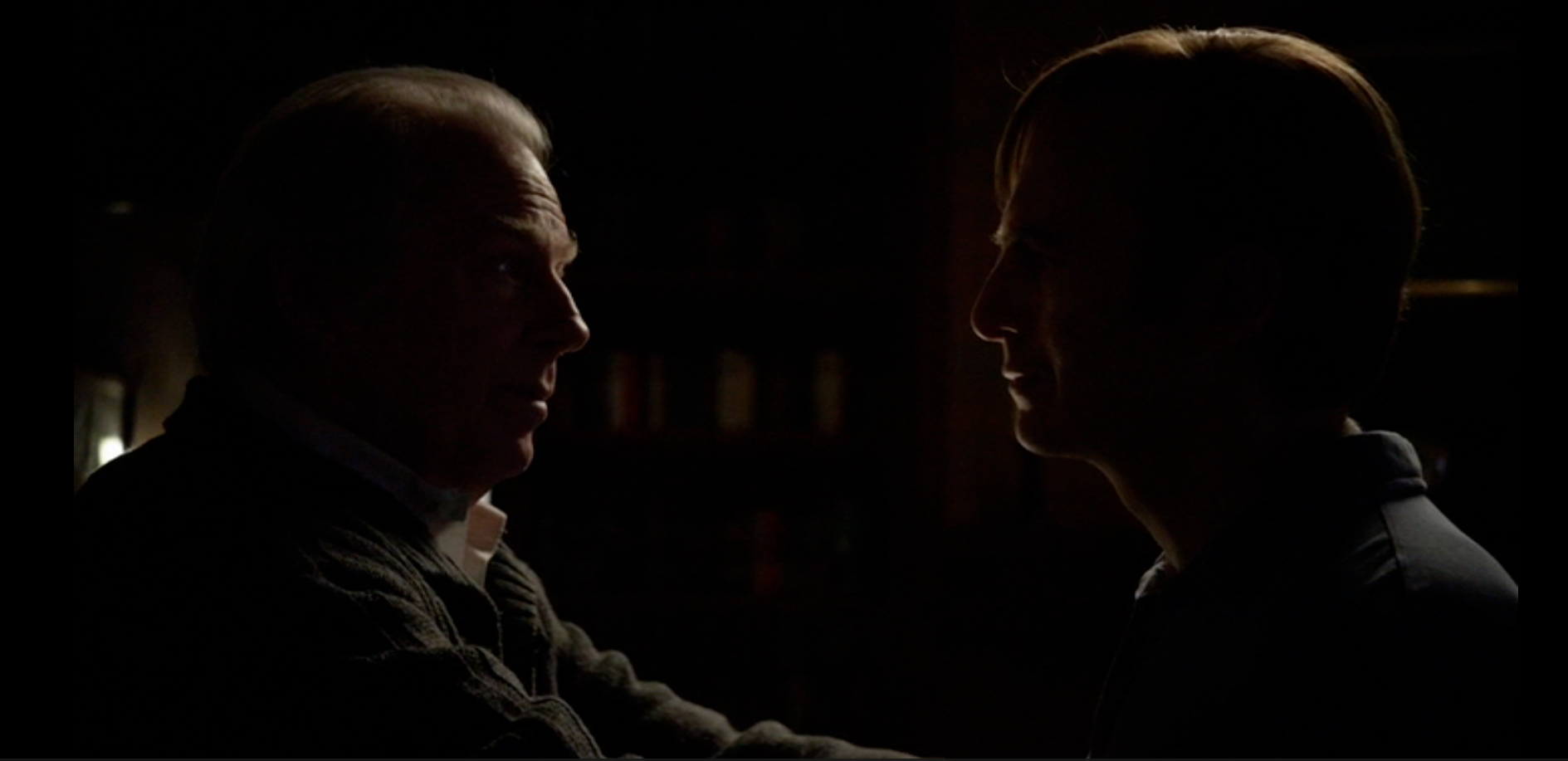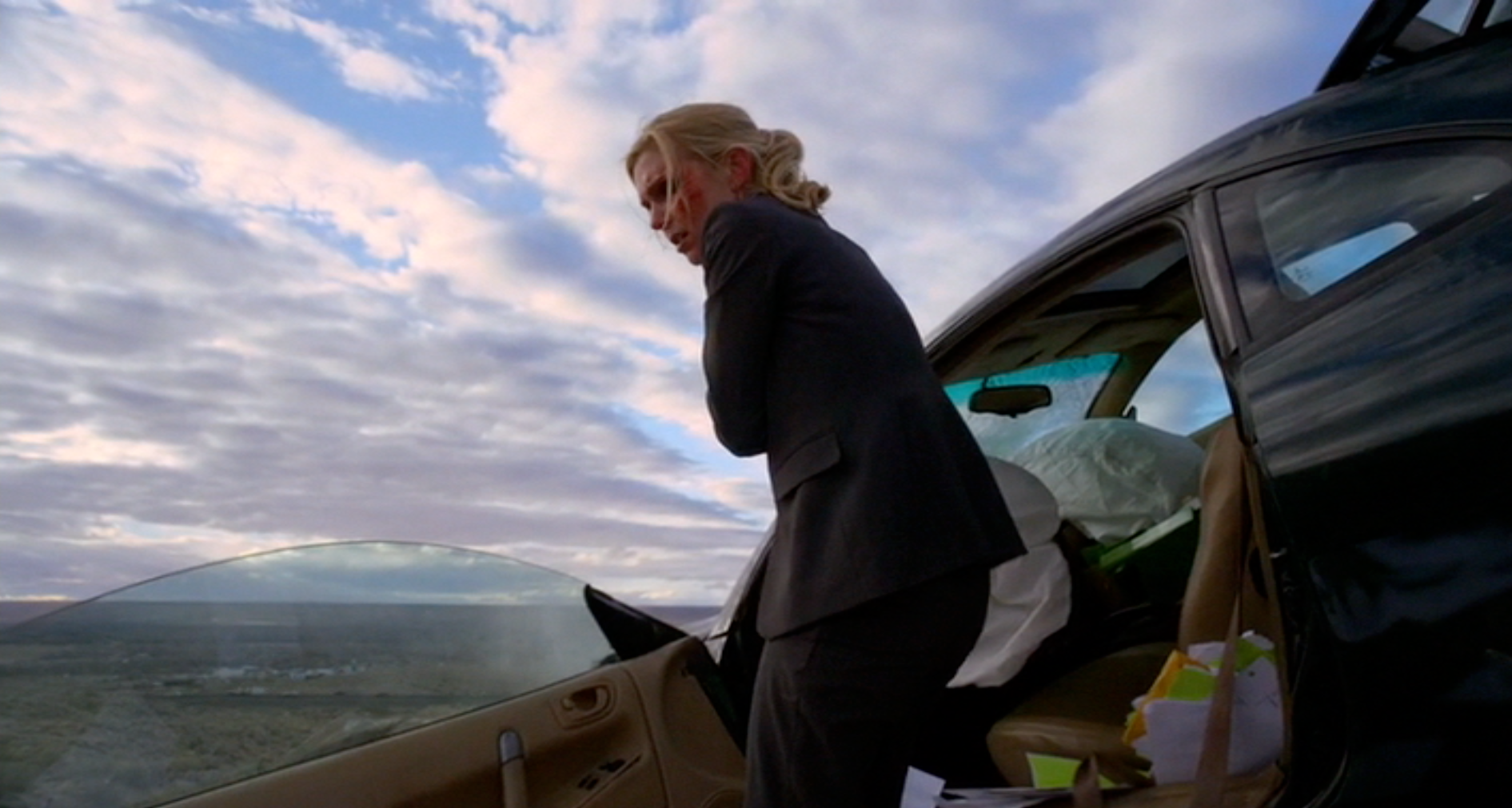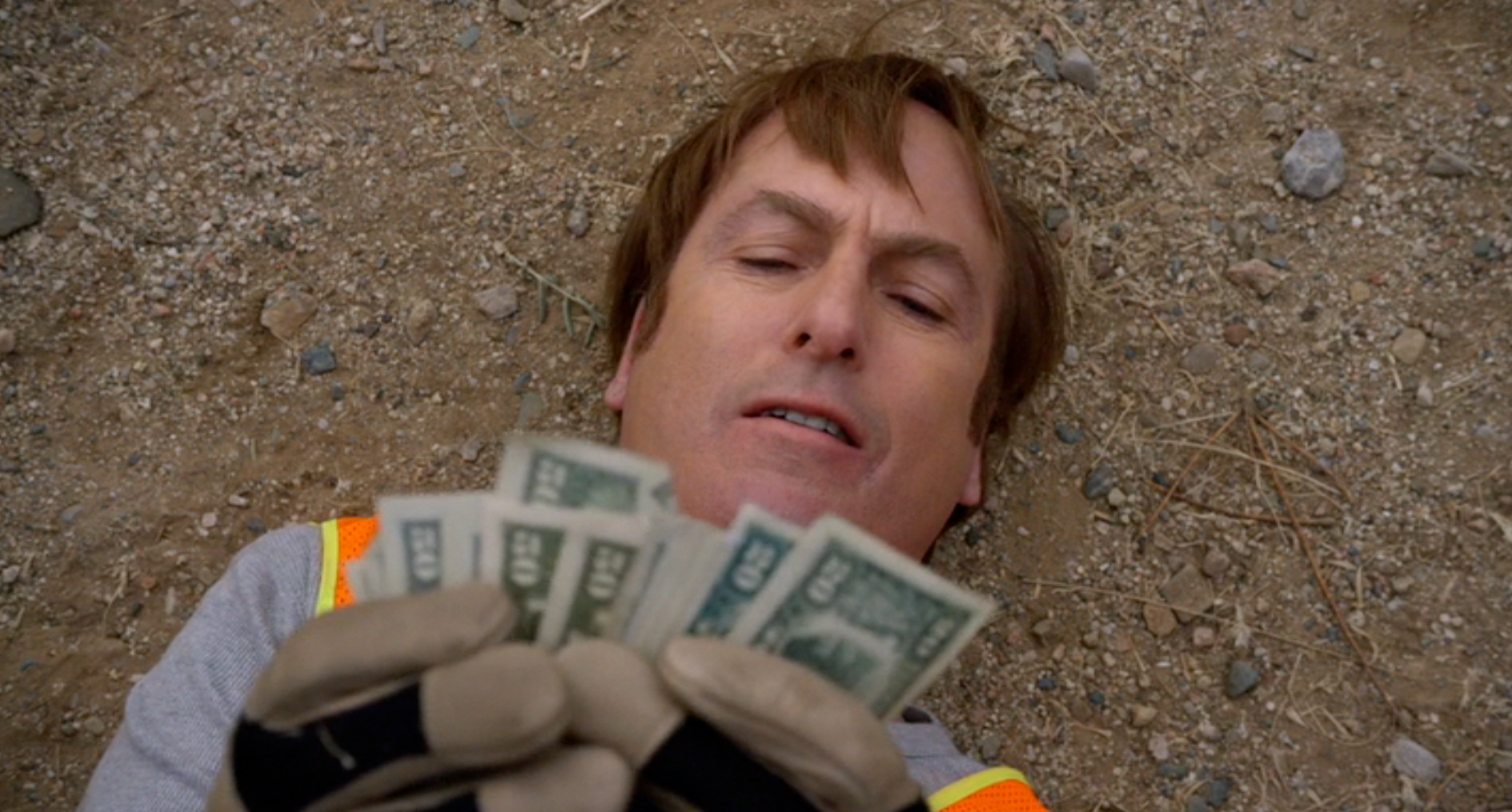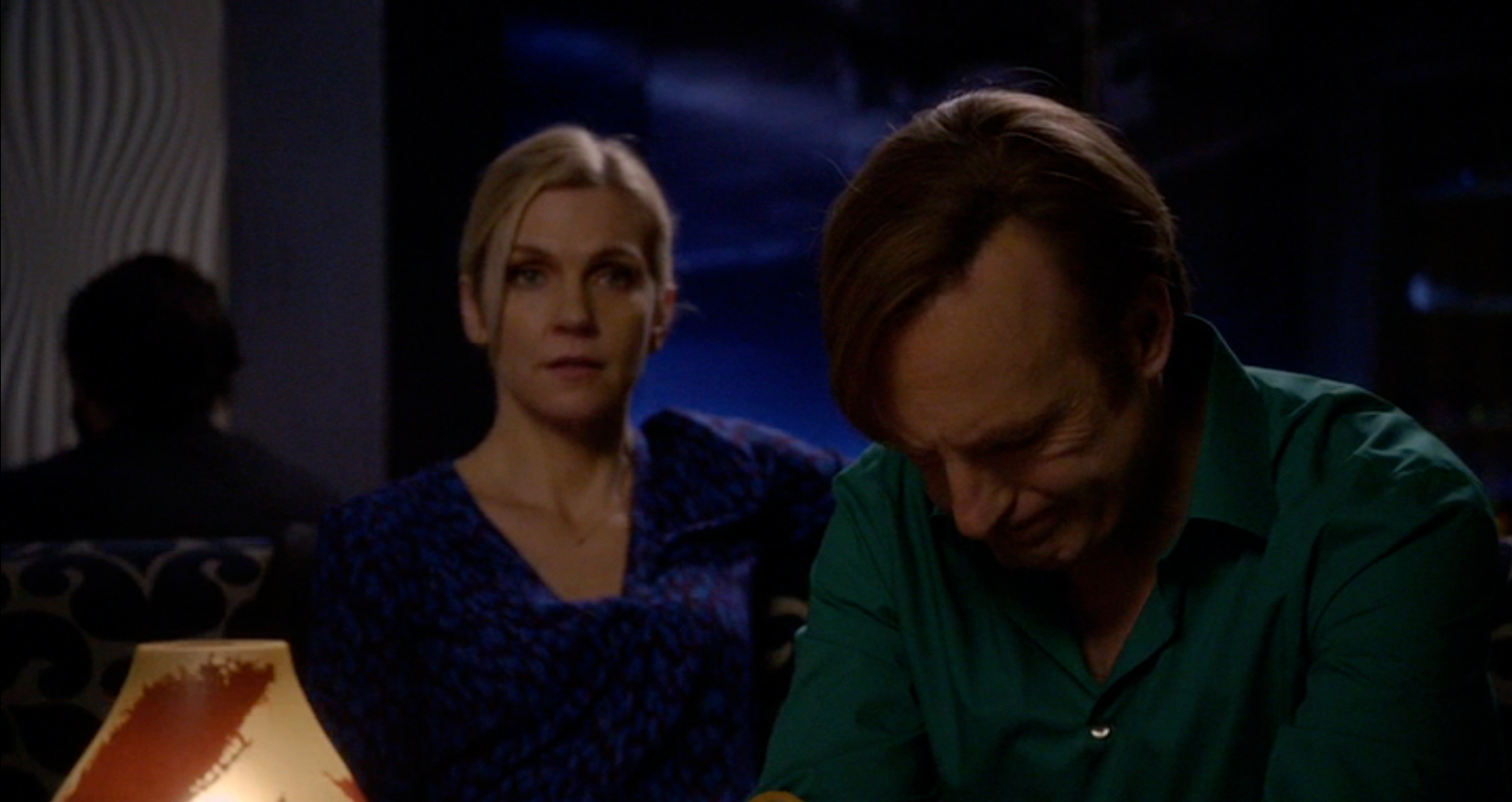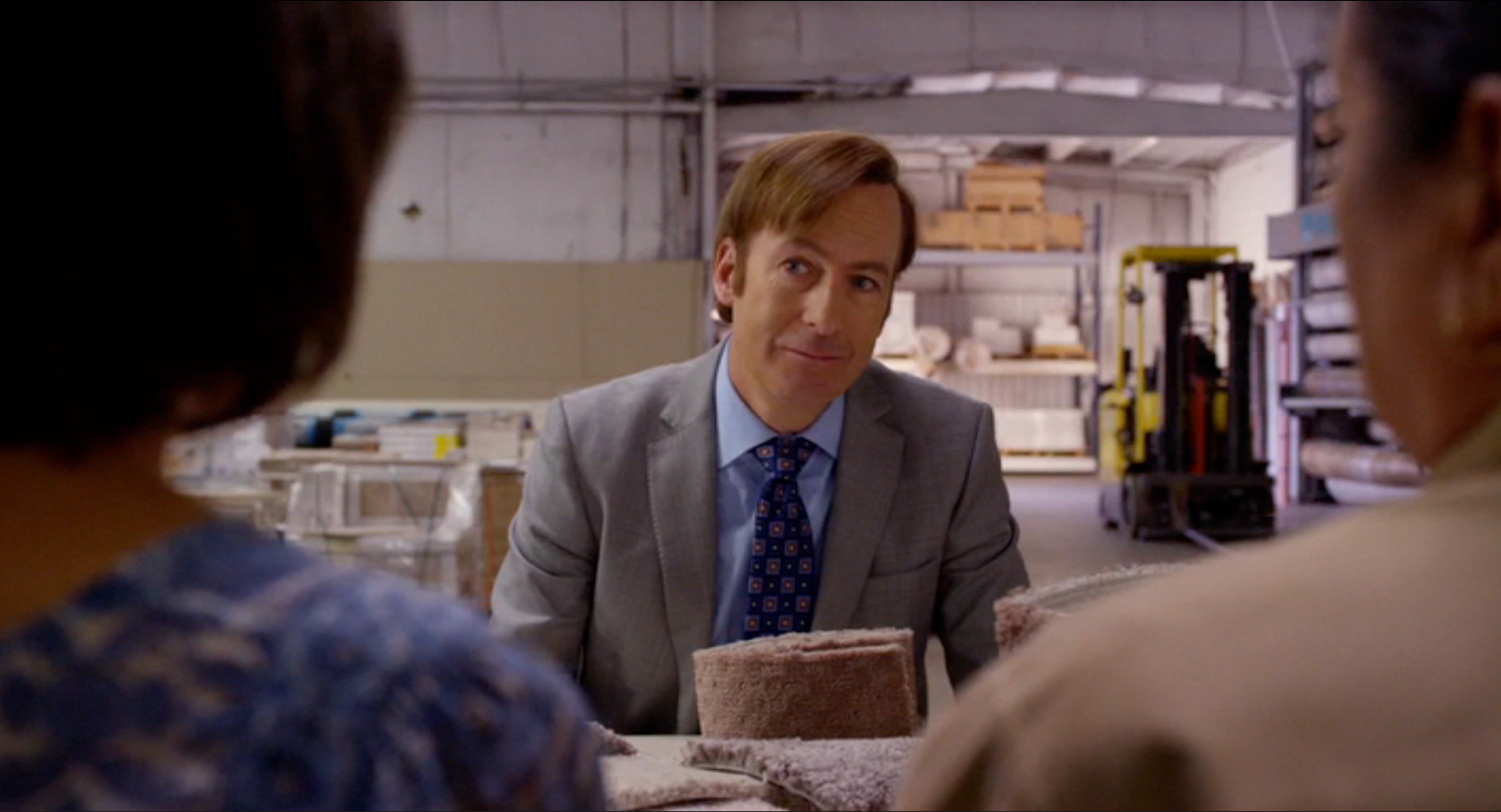It’s easier at the end of a serialized season to reflect on that batch of episodes as a whole than to reflect only on that chapter.
That’s because we’ve reached the end, at least temporarily, and as threads are tied up and pieces shuffled into place for the eventual season four, what we’re really left with is perspective. We talked a bit last week about how an ending can define a journey. And, frankly, I think last week’s episode was more than enough proof of that fact.
So leave it to “Lantern” to illustrate it even better.
More than ever before: spoiler warning.
“Lantern” ends with Chuck burning himself alive in his living room. Of course, if you don’t see a body, the best you can do is assume. But, two points about that. First, neither Breaking Bad nor Better Call Saul have been in the habit of false deaths or surprise resurrections. If you’re led to believe something, it’s nearly always because it actually happened. You may well be missing some necessary context, but the end result doesn’t change. And second, we’re clearly led to believe that this final.
There are ways out of this. Maybe Jimmy is parked across the street, sees the fire, and rushes in to save his brother. Maybe Chuck has second thoughts and crawls out onto the lawn. Maybe Walter White falls through a time portal and resets the universe. So, yes, no matter what, season four can do whatever it wants to do. There’d even be a minor precedent for it: in the first episode of season two, Jimmy walked back the decision he made at the end of season one.
But I don’t get the feeling that’s what the show will do here. At least, I hope it doesn’t. Better Call Saul is very much a show about consequences. About dealing with fallout, both expected and unexpected. About doors closing on you and finding fewer and fewer of them left open with each passing day. Undoing this would help very little, and wouldn’t really seem to be within the intentions of the show. Especially since “Lantern” brings so many other decisions to a head, and forces the characters to face their consequences.
Before we get to that, though, let’s talk about Chuck. The ending of “Lantern” positions him as the emotional centerpiece of season three. We opened with him having one kind of breakdown, and close with him having another, very different one. He started off (in flashback) feigning new depths of his illness, and ended experiencing them for real. The notable difference between the two is that when he was only playing, he was simply a confused and batty old man. Here he’s unhinged and, ultimately, suicidal.
To go from one to the other requires a journey. The slip from being so in control of a situation that you can fake your symptoms to being so helpless that you’re at the mercy of them is significant, and season three as a whole describes that transition.
Chuck rose and fell and then rose and fell again throughout the course of these ten episodes. He got the upper hand over his brother with a surreptitious recording, and was then exposed and humiliated in a courtroom. That experience placed him on a genuine road to recovery that saw him make significant progress and start to get his life back together, just for it all to come crashing down. Likely for good.
He played his hand tonight against Howard, and lost. “You won,” Howard says, and I know he believes it. After all, nine million dollars of Howard’s own money and loans in his name were promised to Chuck just to get him to shut up. But for Chuck, it was his last way back in the door at HHM, and it closed instead. Howard would rather be millions of dollars in debt than work with Chuck for another day. That stings.
And it makes his eventual breakdown that much more believable. In that meeting with HHM’s key stakeholders, Chuck was acting and speaking as though he were in control. The reality was very different. When it hit him, he was left literally speechless. His former colleagues gathered to applaud him…but he left the building alone. It was over.
For Chuck to die here…it would make a perfect kind of sense for the character. To Chuck, power was important. He was an intelligent man. A gifted lawyer. A savvy judge of character. He had knowledge and abilities that nobody else had. He stood out in his field. He was respected. He built a massive, successful firm from the ground up, and he did it through hard work and tenacity.
But doors close on you. We watched it happen.
Chuck’s death would also make a perfect kind of sense for Jimmy’s character. His older brother told him, point blank, “The truth is, you’ve never mattered all that much to me.” For that to be the last thing he ever hears from his brother…well, that would obviously be meaningful. And would be a completely understandable shove forward on the road to becoming Saul Goodman.
Chuck’s snipe also punctuates a lecture to Jimmy — the latest and possibly last — about how Jimmy is doomed to hurt those around him. Why regret anything? The cycle begins anew. People get hurt. Jimmy feels bad, sure, but if people get hurt again…what does that say about Jimmy?
I think I know what it says about Jimmy, and it’s not what Chuck thinks it says. You each have your own feelings as well. But the fact is that this is coming from somebody Jimmy admires, cares about, and loves. For him to hear that Chuck believes others would be better off staying far away from him…that’s painful. That’s cruel. And that’s bound to lead to some soul searching. Where, ultimately, he’s going to decide that his soul isn’t worth much at all.
To Jimmy’s immense credit, he does his best to undo much of the damage he caused. He’s correct that he can’t put the genie back in the bottle, but if he can get some old ladies to be friends again — even at the cost of his reputation — he’ll do it. It’s similar to what he did for Chuck in “Klick” last season; he confesses to his own wrongdoing just to help somebody else feel better. He’ll set himself back to pull somebody else forward. That’s Jimmy…not Saul.
But at some point, he stops doing that. At some point he starts putting himself above others. At some point he doesn’t have the twinge of conscience that makes him do the right thing.
Doors close on you.
I will add that I really liked seeing Erin playing along to help things work out…even if she wasn’t “playing” all that much. She’s a great character and one I was glad to see again. Hopefully it won’t be the last time we see her…or Francesca. We know that the latter plays a big part in Saul’s life, but for now, she’s let go. Just because she hitched her wagon to a dual practice that wasn’t fated to last. Another great character kicking around the universe, looking for a path forward.
Elsewhere Nacho deals with the consequences of his own actions…which endanger his father almost immediately. I mentioned before that Nacho is the one true wildcard in that section of the story. We know exactly what becomes of Hector, Tuco, Gus, Victor, et al. But Nacho’s fate is unknown, which means he’s the one character that can unexpectedly die. I still don’t think we care about him anywhere near as much as we cared about Jesse Pinkman, for instance, or Hank, or even Gayle, but if Better Call Saul chooses to develop the character further, we could be in for some real heartache in the future.
Oh, hey, I might as well bring this up since I see people talking about it elsewhere: Yes, Saul mentions Ignacio when he meets Walt and Jesse in Breaking Bad, and we’ve been told that he’s referring to Nacho. Some folks have taken that to mean that Nacho is alive at that point in time…but that isn’t true at all. All it means is that Saul doesn’t have knowledge of his death. He could be lying in a shallow desert grave at that point. The only thing it proves is that the lawyer believes he’s still alive.
Okay, sorry, just wanted to clear that up. Nacho’s fate is very much in flux, and possibly in jeopardy. His gambit with the pills pays off this week, and he even gets the opportunity to cover his tracks as everyone else scatters, but Gus gives the boy a knowing glance. This is either good news or bad news for Nacho. Gus does a fantastic job of keeping that uncertain.
Then there’s Kim…who takes some well deserved time off. I don’t have much to say about her at this point, except that I’m very curious to see where the character goes next.
None of our major figures are in the same place now as they were when season two began. Howard is in debt without a partner, Francesca’s been let go, Kim is on indefinite leave, Jimmy’s no longer practicing, Chuck’s on fire…
Season three began with such promise for everyone. Season four will begin with so little left clearly ahead for any of them.
Doors close on you.
Notably absent in the finale was Mike. Which was an odd choice. I’m sure it wouldn’t have fit so I’m not complaining, but ideally I would have put his short scene with Lydia in this episode instead, just to give him an ending as well.
Instead it just feels odd not to check in with our deuteragonist. Then again, Mike’s been pretty…underutilized this season. Both seasons one and two had a lot for him to do, but here he spent several episodes just following a trail. Sure, it led him to Gus…but aside from that, did Mike really have a story? Or did he just jog around the map for a bit?
I expect season four to rectify this. Now he’s on the payroll, and he can get up to all manner of shenanigans with those wacky chicken slingers. But season three seemed like an awful lot of effort to move him incrementally forward.
I still think Better Call Saul is at its best when it’s not setting a place at the table for Breaking Bad. We’ve seen that show. We know that show. We can watch that show any time.
I want Better Call Saul to be about Jimmy. About who he is. About how he changes. About what matters to him and why he’s doomed to lose it.
So far, Gus, Hector, Tuco, and even Mike don’t factor into that much, if at all. It’s a separate story competing for airtime, shouldering Better Call Saul out of the way to make room for characters that won’t matter to this series as much as they mattered to one that’s already off the air.
That’s my wish as season three ends. Better Call Saul is so good that I want to spend more time with it, and I want to know that the time I am spending — all of it — serves this show and not its smarter, more popular, more admired older brother. Gus and Hector and all the rest of those crazy kids can pop up all they like…but they need to be a part of Jimmy’s story. They can’t be an irregular distraction from it.
For now, though…that’s it. The door has closed on season three, and I appreciate you taking the time to watch along with me. I know these reviews don’t get as many comments, but a lot of people seem to read them. I can only hope you’re enjoying them as much as I am.
Oh, and if you’re curious what song was playing when Jimmy went to visit Chuck, here you go. It’s one of my favorites, and one of the saddest compositions I’ve ever heard. It was used to incredible effect here. The perfect soundtrack to the last time Jimmy would ever see his brother alive. Or, as Thomas Pynchon put it in Gravity’s Rainbow, “Certainly not the first time a man has passed his brother by, at the edge of the evening, often forever, without knowing it.”
See you in a year for season four.
